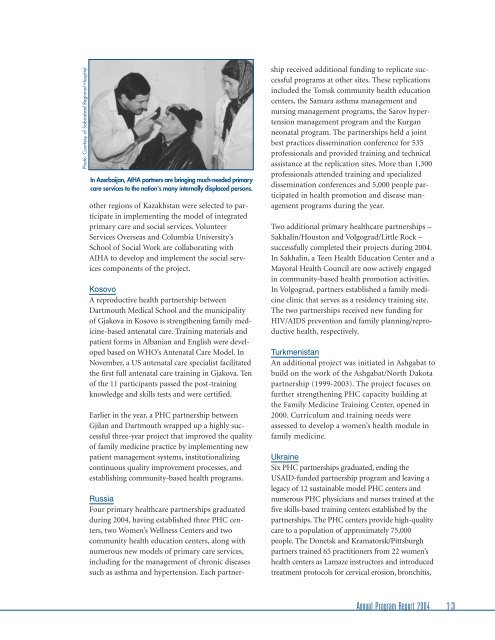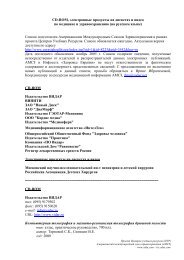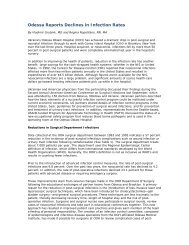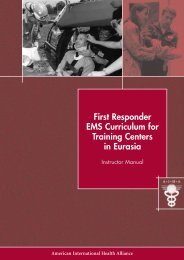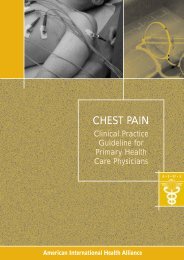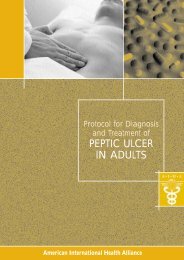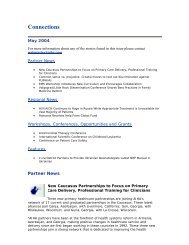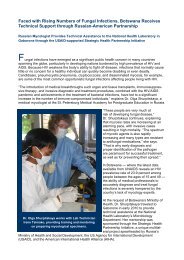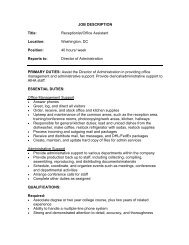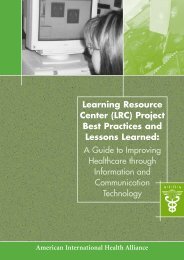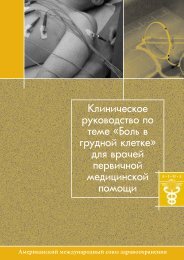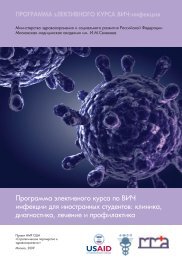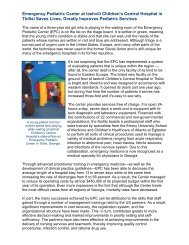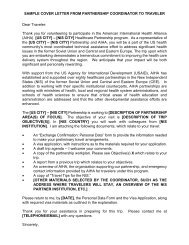Annual Program Report 2004 - American International Health Alliance
Annual Program Report 2004 - American International Health Alliance
Annual Program Report 2004 - American International Health Alliance
Create successful ePaper yourself
Turn your PDF publications into a flip-book with our unique Google optimized e-Paper software.
Photo: Courtesy of Sabirabad Regional Hospital<br />
In Azerbaijan, AIHA partners are bringing much-needed primary<br />
care services to the nation's many internally displaced persons.<br />
other regions of Kazakhstan were selected to participate<br />
in implementing the model of integrated<br />
primary care and social services. Volunteer<br />
Services Overseas and Columbia University’s<br />
School of Social Work are collaborating with<br />
AIHA to develop and implement the social services<br />
components of the project.<br />
Kosovo<br />
A reproductive health partnership between<br />
Dartmouth Medical School and the municipality<br />
of Gjakova in Kosovo is strengthening family medicine-based<br />
antenatal care. Training materials and<br />
patient forms in Albanian and English were developed<br />
based on WHO’s Antenatal Care Model. In<br />
November, a US antenatal care specialist facilitated<br />
the first full antenatal care training in Gjakova. Ten<br />
of the 11 participants passed the post-training<br />
knowledge and skills tests and were certified.<br />
Earlier in the year, a PHC partnership between<br />
Gjilan and Dartmouth wrapped up a highly successful<br />
three-year project that improved the quality<br />
of family medicine practice by implementing new<br />
patient management systems, institutionalizing<br />
continuous quality improvement processes, and<br />
establishing community-based health programs.<br />
Russia<br />
Four primary healthcare partnerships graduated<br />
during <strong>2004</strong>, having established three PHC centers,<br />
two Women’s Wellness Centers and two<br />
community health education centers, along with<br />
numerous new models of primary care services,<br />
including for the management of chronic diseases<br />
such as asthma and hypertension. Each partnership<br />
received additional funding to replicate successful<br />
programs at other sites. These replications<br />
included the Tomsk community health education<br />
centers, the Samara asthma management and<br />
nursing management programs, the Sarov hypertension<br />
management program and the Kurgan<br />
neonatal program. The partnerships held a joint<br />
best practices dissemination conference for 535<br />
professionals and provided training and technical<br />
assistance at the replication sites. More than 1,300<br />
professionals attended training and specialized<br />
dissemination conferences and 5,000 people participated<br />
in health promotion and disease management<br />
programs during the year.<br />
Two additional primary healthcare partnerships –<br />
Sakhalin/Houston and Volgograd/Little Rock –<br />
successfully completed their projects during <strong>2004</strong>.<br />
In Sakhalin, a Teen <strong>Health</strong> Education Center and a<br />
Mayoral <strong>Health</strong> Council are now actively engaged<br />
in community-based health promotion activities.<br />
In Volgograd, partners established a family medicine<br />
clinic that serves as a residency training site.<br />
The two partnerships received new funding for<br />
HIV/AIDS prevention and family planning/reproductive<br />
health, respectively.<br />
Turkmenistan<br />
An additional project was initiated in Ashgabat to<br />
build on the work of the Ashgabat/North Dakota<br />
partnership (1999-2003). The project focuses on<br />
further strengthening PHC capacity building at<br />
the Family Medicine Training Center, opened in<br />
2000. Curriculum and training needs were<br />
assessed to develop a women’s health module in<br />
family medicine.<br />
Ukraine<br />
Six PHC partnerships graduated, ending the<br />
USAID-funded partnership program and leaving a<br />
legacy of 12 sustainable model PHC centers and<br />
numerous PHC physicians and nurses trained at the<br />
five skills-based training centers established by the<br />
partnerships. The PHC centers provide high-quality<br />
care to a population of approximately 75,000<br />
people. The Donetsk and Kramatorsk/Pittsburgh<br />
partners trained 65 practitioners from 22 women’s<br />
health centers as Lamaze instructors and introduced<br />
treatment protocols for cervical erosion, bronchitis,<br />
<strong>Annual</strong> <strong>Program</strong> <strong>Report</strong> <strong>2004</strong> 13


